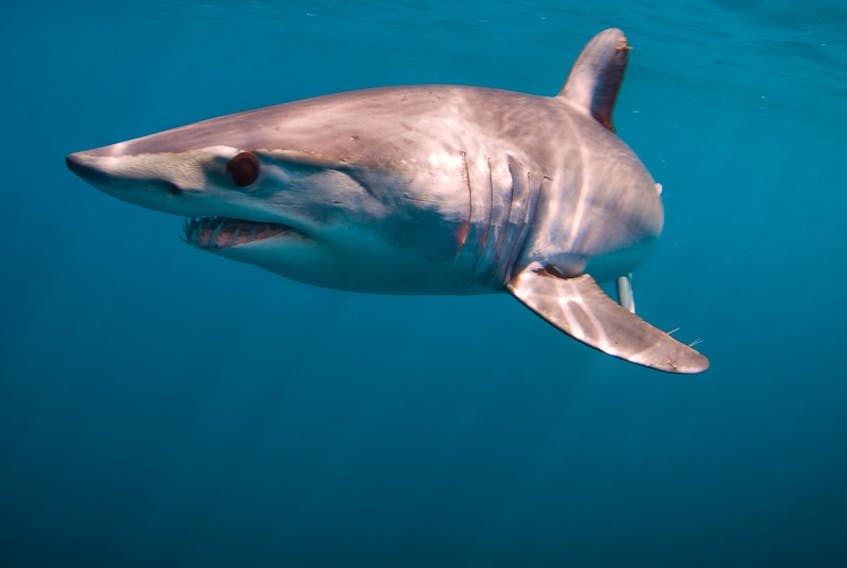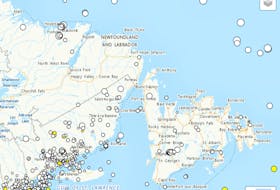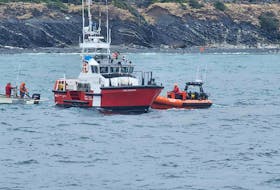Canada is piggybacking off a proposal by Senegal in an attempt to save the endangered shortfin mako shark.
Earlier this week, just days ahead of an international fisheries meeting, Canada signed on to a proposal by the West African nation that would ban the retention of the species by fishing vessels.
The proposal is being debated over the next week by 53 member nations of the International Commission for the Conservation of Atlantic Tunas (ICCAT) in Mallorca, Spain.
Shannon Arnold, senior co-ordinator of the marine program with the Halifax-based Ecology Action Center, is in Mallorca for the meetings, which wrap up on Monday. She said despite Canada’s efforts to protect the species, it still ranked sixth among all ICCAT countries in 2018 for shortfin mako catch.
“We do have fisheries that catch mako shark as a bycatch — so, while they're trying to catch swordfish and tuna, they're also catching different types of shark. One of them is mako,” Arnold said.
“It’s one of the more endangered and vulnerable sharks that we have in the Atlantic, and it’s just taken a nosedive ... so, that’s why we're here trying to get some limits on it.”
According to a DFO fact sheet, the shortfin mako can be found from Argentina and the Gulf of Mexico to Browns Bank, along the continental shelf of Nova Scotia and even into the Gulf of St. Lawrence.
Managing bycatch numbers
The mako shark is classified as endangered internationally and Canada’s Committee on the Status of Endangered Wildlife in Canada (COSEWIC) reassessed the shark as endangered earlier this year.
In August, Canada supported international trade measures on the species at the Convention on International Trade in Endangered Species.
Two years ago, ICCAT members decided to make it so that targeted mako fishing was prohibited and fishers had to release any live bycatch. Arnold said that didn't quite work.
While fishers can’t directly target mako, Arnold said they’re allowed to keep any dead fish they catch as part of their other fishing activities, and it’s not illegal to buy or sell mako shark. It’s also a valuable species sought after for meat, fins and sport.
“There's a very big market for them, they’re economically important, so people want to land them,” said Arnold.
“Because there's a market, there’s an incentive to try and get around the rules.”
With the current rules, she said it’s very easy for bycatch to be underreported, or a live bycatch to be killed and reported as dead. The rules proposed by Canada and Senegal, however, would be much easier to enforce because it targets the species at the landing stage, which has good infrastructure for tracking in North American and Europe. Arnold said fishers would have to put any mako caught, alive or dead, back into the ocean.
Dubious bycatch claims
According to Arnold, many European Union countries such as Spain continue to land a much higher tonnage of mako than would be feasible if it were truly just bycatch.
“Europe will say it's only a bycatch fishery but what is a little bit contradictory is that they've put a proposal on the floor saying right now they're catching 2,000 tonnes and they're going to reduce that right down to a couple of hundred tonnes because their fisherman can avoid the mako,” she said. “The interesting question is if you're not targeting makos because this is just a bycatch, how are you going to avoid them? No one will come right out and say.”
Arnold says ICCAT’s scientific committee is advising that the only way to preserve the species is by stopping retention completely in order to take away any incentive. That is also what Canada and Senegal are proposing. Their proposal also includes precautionary protections for the South Atlantic mako based on scientists' warnings.
“It sounds like quite a drastic measure, but even if they stop catching them tomorrow, they're still going to keep declining because they generally catch juveniles,” Arnold said.
Updated projections pushed the earliest possibility for recovery to 2045, five years later than predicted just two years ago. Even in this scenario, there’s just a 53 per cent chance that the population will recover.
Despite the scientific evidence that exists to back up the benefits of banning the retention of shortfin mako shark, Arnold said Canada and Senegal will be in for a battle in convincing other nations to sign on. The European Union and the United States, which has a lucrative recreational fishery, have offered their own last-minute proposals that would allow North Atlantic shortfin mako catches of 500-700 tonnes.
But, according to the Ecology Action Centre, those proposals would prolong a recovery period that already spans decades and leaves the South Atlantic population completely unprotected.
Arnold said if anyone wants to be able to fish mako again, these protections need to be put in place.
“The fact of the matter is, mako has been overfished it for many years,” she said. “Mako was in a more healthy position for the last number of years and we were just saying ‘look guys just put a limit on it, just stop catching so many’ and now, unfortunately, we're at the point where the science is now saying you can't keep any. They kind of missed their window of opportunity.”
RELATED:









